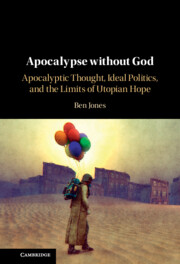Book contents
- Apocalypse without God
- Apocalypse without God
- Copyright page
- Dedication
- Contents
- Figures
- Preface
- Acknowledgments
- Introduction
- Part I Secular Apocalyptic Thought
- Part II Historical Case Studies
- Part III Implications for Ideal Theory
- Appendix Argument against Ideal Theory’s Plausibility
- Bibliography
- Index
- References
Bibliography
Published online by Cambridge University Press: 14 April 2022
- Apocalypse without God
- Apocalypse without God
- Copyright page
- Dedication
- Contents
- Figures
- Preface
- Acknowledgments
- Introduction
- Part I Secular Apocalyptic Thought
- Part II Historical Case Studies
- Part III Implications for Ideal Theory
- Appendix Argument against Ideal Theory’s Plausibility
- Bibliography
- Index
- References
Summary
- Type
- Chapter
- Information
- Apocalypse without GodApocalyptic Thought, Ideal Politics, and the Limits of Utopian Hope, pp. 203 - 221Publisher: Cambridge University PressPrint publication year: 2022
- Creative Commons
- This content is Open Access and distributed under the terms of the Creative Commons Attribution licence CC-BY-NC-ND 4.0 https://creativecommons.org/cclicenses/



